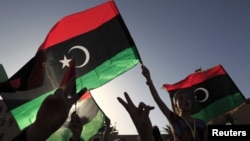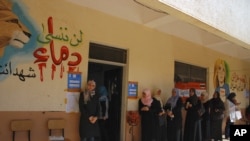Counting has begun as polls closed across Libya, many Libyans taking to the streets to celebrate even though results may not be announced for days.
Voters streamed into polling stations in Tripoli and across Libya Saturday hoping the country's first multi-party elections in 60 years mark the start of a new era. In some parts of the capital crowds began gathering more than an hour before polling places opened.
The electoral commission said the turnout could exceed 60 percent.
In Tripoli, voter Allah Agars was overjoyed by the prospect of a new Libya free of the dictatorship of Moammar Gadhafi.
"It's a great, it's a great day for me because we had victory against Gadhafi and now we think we are very happy," Agars said. "We can build Libya now."
Camilla Rafifi, another Tripoli voter, was equally ecstatic.
"It really was a big dream for me. I didn't expect this day in all my life, really. I'm very, very, very happy," she said. "This will be in the history. We didn't expect this before."
For the most part, Saturday's vote appeared to be peaceful and well organized. That drew praise from election observers like John Stremlau from the U.S.-based Carter Center.
"No election is ever easy, and for a country that has been so isolated for so long, is building state institutions so quickly, it's remarkable how much progress has been made in 11 months," he said. "Truly extraordinary. It should be a source of pride to the Libyan people; they have come so far so quickly."
Nearly three million Libyans registered to vote for members of a 200-seat National Assembly, charged with forming a temporary government and drafting a constitution ahead of full parliamentary elections next year.
Election officials say 94 percent of all polling stations opened as planned. The only problems reported were in eastern Libya, including the cities of Benghazi and Ajdabiya, where protesters disrupted some polling centers and burned ballots.
In Ajdabiya, election officer Miftah al-Mgariaf said young residents were quick to respond.
"We were surprised by a group who attacked the guards at the polling station, and they set fire to the ballot boxes as you see, then the youths in the area brought more security to protect the polling station," al-Mgariaf said.
Later Saturday, Libya's electoral commission said voters at the sabotaged polling stations were being asked to go back and vote as new voting materials were being sent. There were also reports that voting at some of the troubled polling stations was extended to give people more time to cast their ballots.
Despite the problems, Libya's efforts got the approval of U.S. Senator John McCain.
"Already we started early at the polls and we observed the people who enthusiastically have exercised the fundamental right of people if you’re going to have a democracy and that is a fair election," he said. "There were some problems in the eastern part of the country. I’ve been informed that most of those problems have been resolved."
Even displaced Libyans got to vote.
Ahmed Elcash is among the many displaced residents of the town of Tawergha who cast his ballot at a refugee camp outside the capital.
"We feel sadness and sorrow because we voted outside our land," he said. "We hope the new government will be strong and fair and they will give us our land back."
Many of Tawergha's residents had been loyal to former dictator Gadhafi and fled their homes once his regime began to collapse.
Libya's revolution last year, one of the central events in the pro-democracy uprisings that became known as the Arab Spring, began in the east. Since Gadhafi was overthrown, however, some groups in Benghazi and other eastern cities have said they are being neglected and should have more authority in the new government.
More than 140 parties and small factions competed in the election. Analysts expect Islamists would do well, along with a secular group of officials who played a role in the country's post-Gadhafi transition.
Voters streamed into polling stations in Tripoli and across Libya Saturday hoping the country's first multi-party elections in 60 years mark the start of a new era. In some parts of the capital crowds began gathering more than an hour before polling places opened.
The electoral commission said the turnout could exceed 60 percent.
In Tripoli, voter Allah Agars was overjoyed by the prospect of a new Libya free of the dictatorship of Moammar Gadhafi.
"It's a great, it's a great day for me because we had victory against Gadhafi and now we think we are very happy," Agars said. "We can build Libya now."
Camilla Rafifi, another Tripoli voter, was equally ecstatic.
"It really was a big dream for me. I didn't expect this day in all my life, really. I'm very, very, very happy," she said. "This will be in the history. We didn't expect this before."
For the most part, Saturday's vote appeared to be peaceful and well organized. That drew praise from election observers like John Stremlau from the U.S.-based Carter Center.
"No election is ever easy, and for a country that has been so isolated for so long, is building state institutions so quickly, it's remarkable how much progress has been made in 11 months," he said. "Truly extraordinary. It should be a source of pride to the Libyan people; they have come so far so quickly."
Nearly three million Libyans registered to vote for members of a 200-seat National Assembly, charged with forming a temporary government and drafting a constitution ahead of full parliamentary elections next year.
Election officials say 94 percent of all polling stations opened as planned. The only problems reported were in eastern Libya, including the cities of Benghazi and Ajdabiya, where protesters disrupted some polling centers and burned ballots.
In Ajdabiya, election officer Miftah al-Mgariaf said young residents were quick to respond.
"We were surprised by a group who attacked the guards at the polling station, and they set fire to the ballot boxes as you see, then the youths in the area brought more security to protect the polling station," al-Mgariaf said.
Later Saturday, Libya's electoral commission said voters at the sabotaged polling stations were being asked to go back and vote as new voting materials were being sent. There were also reports that voting at some of the troubled polling stations was extended to give people more time to cast their ballots.
Despite the problems, Libya's efforts got the approval of U.S. Senator John McCain.
"Already we started early at the polls and we observed the people who enthusiastically have exercised the fundamental right of people if you’re going to have a democracy and that is a fair election," he said. "There were some problems in the eastern part of the country. I’ve been informed that most of those problems have been resolved."
Even displaced Libyans got to vote.
Ahmed Elcash is among the many displaced residents of the town of Tawergha who cast his ballot at a refugee camp outside the capital.
"We feel sadness and sorrow because we voted outside our land," he said. "We hope the new government will be strong and fair and they will give us our land back."
Many of Tawergha's residents had been loyal to former dictator Gadhafi and fled their homes once his regime began to collapse.
Libya's revolution last year, one of the central events in the pro-democracy uprisings that became known as the Arab Spring, began in the east. Since Gadhafi was overthrown, however, some groups in Benghazi and other eastern cities have said they are being neglected and should have more authority in the new government.
More than 140 parties and small factions competed in the election. Analysts expect Islamists would do well, along with a secular group of officials who played a role in the country's post-Gadhafi transition.


